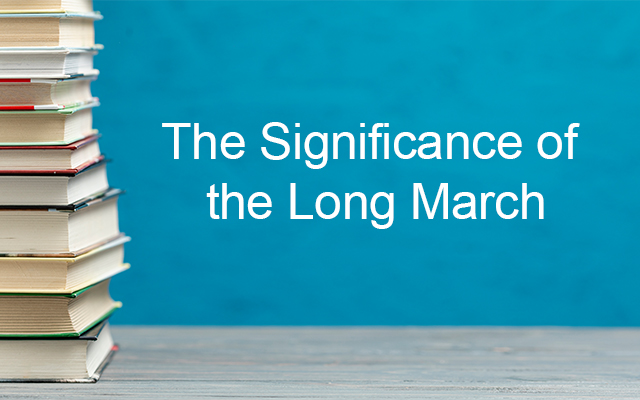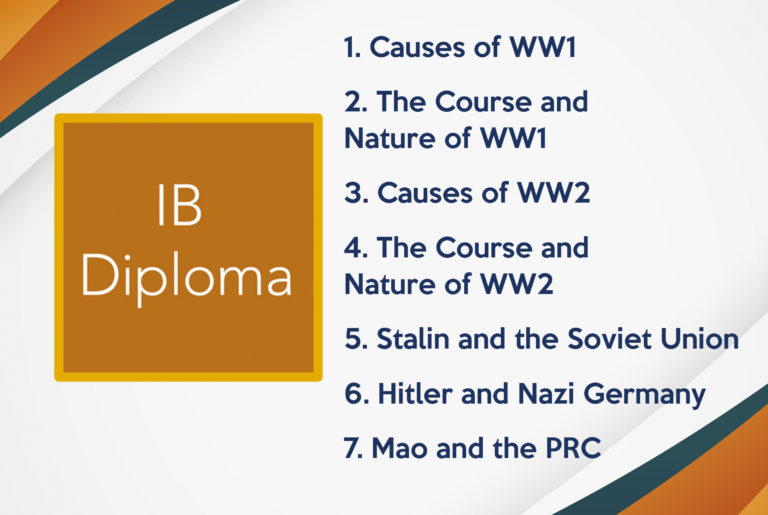Marxism-Maoism
Mao, as befitted a Marxist with their belief in the dialectic (two opposite ideas or forces coming together), trod a path that was all the more remarkable for its opposites. As Michael Lynch puts it, ‘he led a revolution against the world to join the world’1, a rejection of Western values but on a mission to modernise China so that it could match Western achievements, ridding China of the scourge of Western-inspired imperialism by adopting a Western political philosophy: Marxism. And having Sinified Marxism he set out to rid China of its past. Whether they be the ‘three bonds’ (in Chinese, the san gang that hold society together: prince and minister, father and son, and husband and wife) that Mao felt had tied people down for too long. Or as he wrote ten years later in his ‘Report on the Peasant Movement in Hunan,’ the three oppressive systems of authority: the state, the clan and the supernatural or religious, adding a fourth (at least for half the population: the husband. He called them ‘the four thick ropes binding the Chinese people, particularly the peasants.’2 Or as a leader under pressure, the ‘four olds (old thoughts, old culture, old customs, old habits) which he set out to destroy in the Cultural Revolution. Yet Mao remained a man, steeped in Chinese history, Chinese thinking. It was a complex situation, and Mao was a complex man. Indeed Mao admitted himself that his mind was filled with ‘a curious mixture of ideas’.3
The intellectual journey for anyone of Mao’s generation, however, almost certainly began with Confucius and Mao took three things from this Confucian heritage that were to have an influence throughout the rest of his life. First, the notion that every human being, and every society, must have a moral compass. Second, the importance of right thinking. Only if a person’s thoughts were morally right would his actions be right. And third, the importance of self-cultivation.
As far as school subjects were concerned, it was History that became his favourite subject (so be warned!). He read every book he could find on the two founding dynasties of modern China: the Qin and the Hang. And he held interesting views. In an article for the radical magazine, New Youth, written in April 1917, he wrote, ‘Human beings always hate chaos and hope for order, not realising that chaos too is part of the process of historical life, that it too has to value.’ Going on to add, ‘It is the times when things are constantly changing and numerous men of talent are emerging that people like to read about. When they come to periods of peace, they … put the book aside …’4 It gives us an interesting insight into the mind of a budding revolutionary.
His analytical approach to History would come to owe much to Kant who felt that progress was made through the dialectic of one idea being opposed by another before a synthesis, a coming together, occurred. Marx was influenced by this and so, too, was another philosopher: Friedrich Paulsen. In margin notes Mao had made in a partial translation of Paulsen’s System of Ehics, three themes that were to be a strong influence throughout his own political career can be gleaned: the need for a strong state with centralised political power; the overriding importance of individual will; and the complex, sometimes clashing, sometimes complementary, relationship between Chinese and Western traditions. This last theme, the relationship between Chinese and Western thinking, was a tricky one for those Chinese wanting change, particularly the more radical amongst them. For Mao, Paulsen reflected the problem perfectly: ‘All nations inevitably go through the stage of old age and decline. With time, tradition acts as an obstacle to the forces of renewal and the past oppresses the present.’5 Yet it was still a delicate balancing act to be played out.
True to Kantian philosophy, Mao was seeking a synthesis between traditional Chinese thinking and Western radicalism. His aim, already evident and set to be a constant throughout his political life, was no less than the complete transformation of China, and it was somehow to be achieved by a dialectic, between the old and the new, between Chinese traditional thinking and both Western and Chinese radicalism. Mao acknowledged the dialectic as an analytical tool and as a driving force in history through the work of Kant and Paulsen. It was also what observation and experience had taught him.
We can see that Mao had undertaken quite an intellectual journey and had reached a number of critically important conclusions before he ever considered Marxism. Indeed, Mao in his mid-twenties had little access to Marxism. In 1918 none of Marx’s works or those of Lenin had been translated into Chinese. Little was known of the Bolshevik revolution either. China was quite ignorant of Marxism, Marxism-Leninism, Communism or Bolshevism.
It was an article by Li Dazhao, the librarian who had got him a job as an assistant in the library at Beijing University and one of the leading lights in China’s ‘New Culture’ movement, that led to Mao thinking about the economic nature of the system he was striving to change. Mao came to see that if society was to change, the economic system must be changed too. Mao’s language changed: colleagues became ‘comrades,’ workers became ‘toilers.’ Marxist literature started to become available in China and Mao eagerly sought it out. The Manifesto had a profound influence on him.
Near the end of 1920, aged almost 27, Mao was on the verge of accepting Marxism as the best means to bring about that ‘national revolution’. But it had to fit the Chinese context, and in the winter of 1925 he was still calling for ‘an ideology that has been produced in Chinese conditions.’6 Further, whilst recognising the importance of Marxism, Mao was not going to allow the revolution to get bogged down in dogmatic theory, its actions restricted because it didn’t fit the theory. In one of his more eloquent phrases, he described dogma as ‘less use than dogshit’7 (which at least could be used as manure on the fields).
Of fundamental importance to Mao (and to our understanding of Mao’s China) was his belief in “voluntarism”. For Marxist orthodoxy maintains that it is the economic base and the productive forces that operate within it, eg feudalism or capitalism, that determine the political and cultural superstructure of society, eg the “feudal system” of kings, lords and peasants (to simplify it), or the parliamentary system in capitalism. The superstructure, the political system and the culture it develops, then obstructs the development of the economic base in any way that doesn’t benefit it. Whereas voluntarism gives more significance to the ideas, the will, and the actions of people. And this belief, that more than any other single factor, history, including revolution, is the product of the ideas, the will, and the actions of people: individuals, groups, revolutionaries, classes, the masses, sets Maoism apart from Marxism. It was noticeable that, in a tribute marking Stalin’s sixtieth birthday in 1929, Mao wrote, ‘Stalin’s deeds are the materialisation of his words. Marx, Engels and Lenin did not build a socialist society but Stalin has.’8 Maoism, in this crucially important aspect, stands in stark contrast to orthodox Marxist determinist thinking, i.e. that the objective forces of historical development, for example the forces created by capitalism will inevitably develop a class consciousness amongst the proletariat that will lead them to overthrow their oppressors, the bourgeoisie. Though it doesn’t leave him so far from Lenin and the role to be played by a revolutionary vanguard.
Mao’s belief in voluntarism was also founded on an essentially populist perspective, a belief in the masses. Mao called for a “great union of the popular masses” (the title of an article published by Mao as early as 1919). He distrusted intellectuals, experts and specialists, bureaucracy and urban life. He held to a romantic ideal of the heroic self-sacrifice of the revolutionary. Above all else, Mao came to believe in the peasantry as a revolutionary force. An important principle that developed in Maoism was Mao’s notion of the ‘mass line’, that Party cadres must first learn from the peasantry before they can teach and lead them. This was widely practised in the Yan’an years and was to feature again in bringing an end to the Cultural Revolution. It sets him apart from Lenin and the central role he gave to the Party, not only in leading the revolution itself (though here he was not so different) but in the continuing central role the Party would play in establishing a socialist state. Mao always had a distrust of intellectuals and the Party hierarchy in general.
If Mao’s “voluntarism” and “populism” were critical departures from orthodox Marxism, an absolutely critical Sinification of Marxism, was Mao’s unshakeable belief that the vast majority of Chinese, which of course included the peasantry, were potentially revolutionary or would at least be benevolently neutral. For Mao, what was more important than the proletariat as a class, was a “proletarian consciousness” and this could not only be found in abundance amongst the revolutionaries but was inherent in the people as a whole, including the peasantry. It merely needed revolutionary action to bring it out, and the revolutionaries would lead the peasantry in bringing this about in their fight against the landlord, their fight against the Japanese and ultimately, their fight against the Nationalists. Thus, Mao was able to “fit” Marxism into the Chinese context. For this made the Marxist objective conditions for revolution present. As Philip Short writes, ‘Through all the years that followed, he never wavered in this belief. It would sustain him in the darkest moments, when all hope seemed to be lost.’9 What is more, in identifying the potential of the peasantry as a revolutionary force, Mao also came to see the landlord class as the principal obstacle to change. The conclusion was clear to Mao, the clash between the peasantry and their landlords was far more significant than that between workers and the bourgeoisie, and for the revolution to succeed, not only had the peasants to be liberated, the landlords had to be smashed. His was to be a rural revolution.
Mao’s Marxism, as just alluded to, was also nationalist rather than universalist. For Mao, the immediate enemy were not so much the bourgeois Nationalists, but the foreigner. When Japan’s infamous Twenty-one Demands were accepted in 1915 Mao called it a day of ‘extraordinary shame.’ He gave further expression to his feeling in a poem that referred to the Japanese as ‘island savages’ and the Russians as ‘hate-filled enemies.’10 This attitude would also manifest itself when the Russian’s sought to control the young Chinese Communist Party through the Comintern. Consequently, class struggle could be subordinated to national struggle, the fight against the class enemy subordinated to the fight against the foreign imperialist. So, prioritising the fight against the Japanese before and during WW2 could be seen as, at one and the same time, fighting for the revolution and fighting for China.
Maoism, then, is not only a revision of Marxism, it is a distinctively Sino revision of it. It is also proof that, as Meisner explains (and Mao would absolutely concur), ‘people are the producers as well as the products of history and that they make their history, at least in part, on the basis of what they think.’11 Of course, the tricky thing is to spot where the one ends, and the other begins!
1 Michael Lynch, Mao, p. 2
2 Philip Short, Mao: A Life, pp. 173-4
3 Michael Lynch, p. 39
4 Quoted in Michael Lynch, p. 37 and Philip Short, pp. 60-1
5 Quoted in Philip Short, p. 62
6 Quoted in Michael Lynch, Mao, p. 46; and Philip Short, p. 162
7 Quoted in Michael Lynch, Mao, p. 116
8 Quoted in Michael Lynch, p. 118
9 Philip Short, p. 159
10 Quoted in Philip Short, p. 58
11 Maurice Meisner, Mao’s China And After, p. 41





